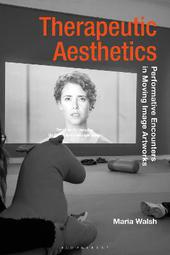
|
Therapeutic Aesthetics: Performative Encounters in Moving Image Artworks
Hardback
Main Details
Description
Therapeutic Aesthetics focuses on moving image artworks as expressive of social psychopathological symptoms that arise in a climate of neoliberal cognitive capitalism, such as anxiety, depression, post- traumatic stress disorder and burnout. The book is not about engaging with art as a therapy to express personal traumas and symptoms but proposes that a selective range of contemporary moving image artworks performatively mimic the psychopathologies of cognitive capitalism in a conflictual manner. Engaging with a range of philosophers and theorists, including Bernard Stiegler, Franco 'Bifo' Berardi, Judith Butler, Felix Guattari, and Eva Illouz, Maria Walsh proposes that there is no cure, only provisional moments of reparation. To address this idea, she uses the concept of the pharmakon, the Greek term for drug which means both remedy and poison. Through this approach, she maintains the conflict between the curative and the harmful in relation to moving image artworks by artists such as Omer Fast, Liz Magic Laser, Leigh Ledare, Oriana Fox, Gillian Wearing and Rehana Zaman. As transitional spaces, these artworks can enable a toleration of anxiety and conflict that may offer another kind of aesthetic self-cultivation than the subjection to biopolitical governance in cognitive capitalism.
Author Biography
Maria Walsh is Reader in Artists' Moving Image at Chelsea College of Arts, University of the Arts London, UK. Her research on artists' moving image and critical theory has been published in the peer-reviewed journals Rhizomes, Angelaki, Screen, Refractory, film-philosophy, NECSUS and MIRAJ.
ReviewsMaria Walsh's book marks a decisive step forward in the study of art as a means of addressing trauma. Through sustained analyses of moving image works, she advances a compelling understanding of their power to relieve psychological damage without airbrushing the social and economic forces underlying it. * Marcus Verhagen, Senior Lecturer in Contemporary Art, Sotheby's Institute of Art, UK * In a series of encounters between moving image practices and a diverse selection of ideas and theories this wide ranging book diagnoses and develops an original concept of pharmological aesthetics. Walsh is highly attuned to what is fast becoming one of the most urgent issues of today - how certain forms of psychic malaise are increasing as other new ones are emerging - and has identified within certain artistic strategies not so much a cure as a complex treatment for them. A very timely work for those interested in the intersections between therapeutics and contemporary art and indeed in contemporary practices of micro-resistance to our latest form of capitalism. * Simon O'Sullivan, Professor of Art Theory and Practice, Goldsmiths, University of London, UK * Applying a feminist politics and drawing on a series of metaphors from medical and therapeutic discourses, Walsh's inspired book Therapeutic Aesthetics shifts attention from traditional definitions of art as transcending the everyday to focus on art as embedded in our current regime of cognitive capitalism. * Amelia Jones, Robert A. Day Professor of Art and Design, University of Southern California, USA * Maria Walsh draws on a wide range of cultural, philosophical and political references, which she skilfully weaves to put forth her newly developed concept of therapeutic aesthetics. * Art Monthly * Walsh masterfully jostles with different bodies of theory - from sociology to psychology, psychoanalysis, philosophy, semiology, as well as media and political theory ... Therapeutic Aesthetics opens a new pathway in aesthetic discourses. * Visual Studies *
|